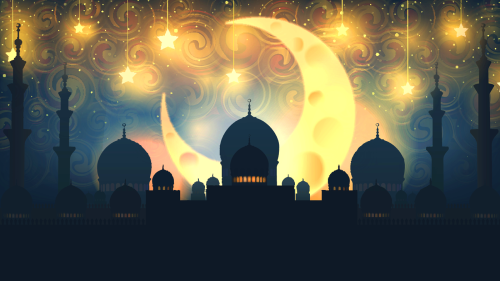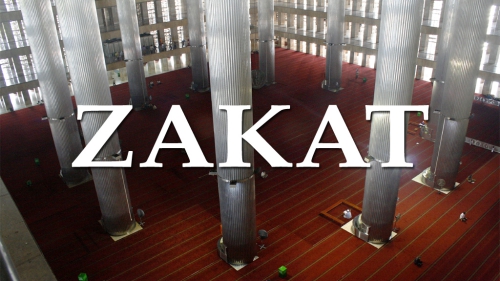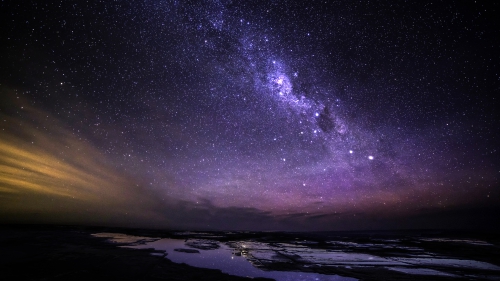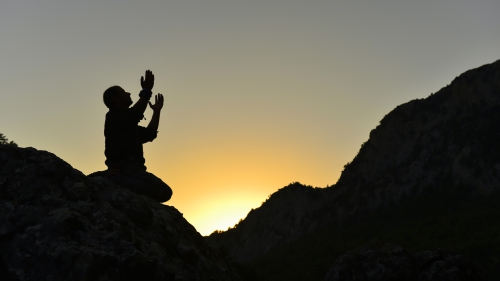Struggle of not being able to fast

When Aatif Sharieff was growing up in a Maryland suburb, none of the other kids in his elementary school knew about Ramadan.
Each year, as the Muslim month of fasting came around, Sharieff had to explain to fellow students why he couldn't eat lunch with them or drink from the water fountain.
"Everybody would ask," he recalls. "It became like a broken record, 'I'm fasting, I'm spiritual.' "
These days, Sharieff finds himself explaining to Muslims and non-Muslims alike why he no longer observes the traditional dawn-to-dusk fast. The 27-year-old Virginia architect lets people know that severe acid reflux means that he cannot go long without food.
"There's this expectation . . . that everyone is fasting, so you kind of feel like this anomaly," he said. "The first question people ask is 'How's your fast going?' "
He has to tell them that it's not.
Each year as Muslims across the world observe Ramadan, which ends this weekend, other members of the faith face the challenge and occasional awkwardness that comes with eating and drinking in public during daylight hours. Some explain their situation to friends and colleagues and eat openly; others take furtive sips of water or quick bites of food in stairwells, cars or even bathrooms.
"You should not eat in public. It's not banned, it's just emphasized that you should respect Ramadan," said Muzammil Siddiqi, a director of the Islamic Society of Orange County and chairman of the Fiqh Council of North America, which rules on issues of Islamic law. "It's not just an individual observance, it's a community observance."
In some predominantly Muslim countries, eating in public during Ramadan is illegal or so socially scorned that the decision for non-fasters is made for them. But in the United States and other countries with Muslim minorities, the choice can be more complicated. There are no rules banning public eating, but a rising cultural and global awareness means that more people -- even non-Muslims -- might ask, "Why aren't you fasting?"
"It's not a hidden phenomena like when I first came to America 35 years ago," said Maher Hathout, spokesman for the Islamic Center of Southern California and a longtime Muslim leader in Los Angeles. He pointed to the annual Ramadan dinners now held at the White House and State Department, and growing coverage of the month by U.S. media outlets.
"Everyone knows, so it's better to eat at home or shut the door of your office," Hathout said.
Fasting for Ramadan can be a bit like filing complicated income tax forms, with various one-time or ongoing exemptions available.
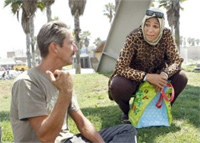 |
| Randy Swing gets a meal in Venice from Nanetta Okonkwo, who has multiple sclerosis and doesn't fast. Muslims exempt from fasting for various reasons must decide whether to eat publicly and face questions about their actions. (Kirk McKoy / Los Angeles Times / August 31, 2009) |
Chronic illnesses such as diabetes or stomach ulcers can put a Muslim out of the Ramadan rotation permanently. Instead of fasting, those with such conditions are asked to feed a hungry person each day of the month. Muslims who are sick, traveling, menstruating, pregnant or breast-feeding have temporary exemption from fasting and must later make up the missed days.
Mariam Moustafa, a recent UC Irvine graduate, said she has never seen the need to eat secretly during Ramadan.
"I really don't care. If I'm sick or on my period, I'm not the type of person who's going to sit and eat in the corner," Moustafa said.
"God gave me the right to not fast those days. It's not me making up those rules, so there's no reason for me to hide it," she said. But she does try to be sensitive, she said, and avoids eating in front of those who are fasting.
Years ago, whenever Nanetta Okonkwo of Inglewood had to forgo the fast, she was careful about eating in public. She worried that if she didn't have a chance to explain, non-Muslims would think Ramadan was optional. So, even at restaurants, she would tell her server why she wasn't fasting.
Two years ago, Okonkwo, 40, was diagnosed with multiple sclerosis. These days, she refrains from eating openly during Ramadan so she won't have to tell people about her illness.
"I want people to know that it's the month of Ramadan and we don't eat in Ramadan," said Okonkwo, a special education teacher. "And if I ate in public, I would feel obligated to explain."
Okonkwo said her inability to fast for the full day has been heartbreaking for her, but she works hard to find other ways to meet her religious obligations.
This year, on the third day of the holy month, she stopped at a natural foods restaurant in Marina del Rey and bought two veggie burger meals. Putting each in a plastic bag, she drove toward Venice, stopping briefly along the way when she spotted a man sleeping on the grass. She tried to wake him but he didn't stir.
At the beach, Okonkwo walked along the bike path until she found a disheveled man standing near a canopy tied to a tree. "It's Ramadan and I can't fast so I have to feed someone," she said quickly, handing him the food.
The man gave her a blank stare, but took the offering.
Hathout, a retired cardiologist, said many Muslims feel guilty about not being able to fast during Ramadan and believe it is an act of piety to try to struggle through it, even against doctor's orders. As both a physician and community leader, he counsels such people that Islam forbids anything that harms the body, such as not taking medication or food when needed. He also tells them that fasting exemptions are a gift from God.
"And it's not nice to not accept a gift from God," he said.
The month is a major part of the Muslim faith. Children often begin fasting for short periods of time at an early age, to practice for when it becomes an obligation once they hit puberty. Even people who ignore other pillars of the religion, including daily prayers and giving charity, will fast, an observance intended to strengthen self-control and remind Muslims of the poor and hungry.
Sharieff stopped fasting in 2005 after his doctor suggested that the ritual might be contributing to his constant acid reflux and vomiting. He was relieved that his medical problem wasn't more serious but also disheartened.
"Fasting for me is something you do. I mean Ramadan, boom, you fast," he said. "Losing that was like losing a piece of . . . my iman," his faith.
Source: Los Angeles Times
Related Suggestions
Just a few days ago, I saw a man wearing the Muslim Cap and the traditional Muslim dress arguing with someone like an idiot in this holy month.
I also believe so many Muslim American paying interests and living on loans with high interests and many using credit cards with high interest buying foods for the breaking of fast.
So, are there Muslims out there?
To be fair: I am 99.999999% Kafir and .000001% Muslim. It takes gut to tell truth.










